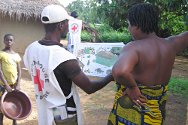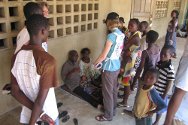Côte d'Ivoire: security situation prevents many from returning home
03-05-2011 Operational Update
For tens of thousands of displaced people in the west and most refugees in neighbouring Liberia, it is still too dangerous to return home. The Ivorian Red Cross and the ICRC are distributing supplies and food, making drinking water available and supporting medical facilities.
Situation critical in the west
The situation in the west of the country, particularly in the area around Zouan Hounien, Toulepleu and Bloléquin, near the border with Liberia, remains critical. Entire villages were devastated by the conflict, and the needs of residents and displaced people are particularly acute. "In this area, the ICRC and the Red Cross Society of Côte d'Ivoire are still among the only humanitarian organizations able to reach the victims on a regular basis without military escorts," said Dominique Liengme, head of the ICRC delegation in Abidjan. "People returning to their home areas often face a difficult situation and require aid to have their lives back."
"In Abidjan, the gradual improvement in the security situation in most communities over the past fortnight has enabled thousands of displaced people to return home, but large numbers of people are still accommodated in reception centres or with host families," added Ms Liengme. "In particular, persistent tension and violence in the Yopougon community are not only preventing the return of displaced inhabitants but also causing new displacement towards the interior of the country or towards neighbourhoods in Abidjan that are considered safer. The living conditions of the displaced are still very difficult."
Aid for victims along road from Zouan Hounien to Toulepleu and Guiglo a priority
In the west of the country, over 2,000 displaced people in Guiglo, and almost 4,000 residents and returnees in Bin Houyé, Toulepleu, Péhé and Sahibly, have been given emergency supplies and food since the middle of April. The items distributed by the ICRC with help from Ivorian Red Cross volunteers included tarpaulins, sleeping mats, mosquito nets, kitchen utensils, hygiene items, nearly 3,000 litres of cooking oil, over 15 tonnes of rice and around six tonnes of beans.
An Ivorian Red Cross mobile clinic staffed by a doctor, a nurse and a midwife continues to provide care, mainly for cases of malaria and diarrhoea, in and around Toulepleu. Over the past fortnight the clinic has provided nearly 400 consultations in Toulepleu, Péhé and Sahibly. Since 26 April, a second team has been covering the area between Guiglo and Bloléquin, and has already helped 450 people. In addition, joint ICRC and Ivorian Red Cross teams are providing medical care in various places in Guiglo, where they have treated nearly 2,000 patients since 13 April.
Nineteen hospitals and health-care centres in the west of the country have been supplied with kits containing enough basic medicines to treat 18,000 people for three months, sets of bandages and around 2,000 doses of medication for treating malaria.
To ensure that displaced people have access to sufficient quantities of drinking water, the ICRC has built platforms for a further three 10,000-litre water tanks in Duékoué, and chlorinated over 1,600 wells in Zouan Hounien, Guiglo and Taï. The ICRC is also continuing to bring in water by truck to fill tanks already installed at three sites in Duékoué, and is pressing ahead with the construction of latrines and showers in places where displaced people have assembled in Duékoué and Guiglo.
Many Ivorian refugees held back in Liberia
"Not only are security conditions in Côte d'Ivoire poor, but because the houses of many refugees have been looted the refugees no longer have tools and seed back home," said Karin Hofmann, head of the ICRC delegation in Liberia. "In these circumstances, returning now would mean missing out on the planting season, with dire consequences." The ICRC, in conjunction with the Liberian Red Cross and the International Federation of Red Cross and Red Crescent Societies, is currently distributing agricultural tools and seed to 3,000 host families in the counties of Nimba and Grand Gedeh to enable them to cultivate their lands. The families shared their seed so generously that they now have nothing left to plant.
The ICRC and the Liberian Red Cross continue to help Ivorian children and other refugees to restore contact with their families. In addition, International Red Cross and Red Crescent Movement partners continue to provide thousands of refugees and host families with safe drinking water in Nimba and Grand Gedeh.
Emergency aid for displaced people in Abidjan
"Many people have been displaced multiple times, from one community in Abidjan to another, in search of safety, with nothing but little sacks in which to carry their meagre belongings," said Ms Liengme. "Occasionally, they have even sought refuge outside the city."
Since 14 April, the ICRC and the Red Cross Society of Côte d'Ivoire have distributed sleeping mats, kitchen utensils, hygiene items and high-protein biscuits to nearly 7,000 displaced people in 12 reception centres in the Abidjan area. In Dabou, where more than 1,200 people displaced mostly from Yopougon and Abobo have found refuge at three sites, ICRC staff have installed 15 large tents at the main site for vulnerable people without shelter.
The ICRC has maintained its support for medical facilities by donating 68 sets of bandages, 57 kits containing basic medicines and anti-malaria drugs, and almost 80 kits of surgical supplies to over 40 hospitals and other health-care centres.
With ICRC support, the Red Cross Society of Côte d'Ivoire put into service four mobile clinics that provide free medical care for the displaced and other vulnerable people in Abidjan and nearby cities. To date, the clinics have helped over 1,200 people. In addition, first-aid workers have treated almost 280 injured or sick people, including over 200 who were taken to the nearest medical facilities.
Visits to detainees
ICRC delegates continue to monitor the conditions in which people arrested in connection with post-election violence or the armed conflict are held, and the treatment they receive, in particular in Bouaké and in two places in Abidjan. Delegates also visit detainees in neighbouring Liberia.
For further information, please contact:
Léa Doua (French), ICRC Abidjan, tel: +225 22 40 00 70
Anne-Marie Altherr (English), ICRC Abidjan, tel: +225 07 44 20 69
Steven Anderson, ICRC Geneva, tel: +41 79 536 92 50


